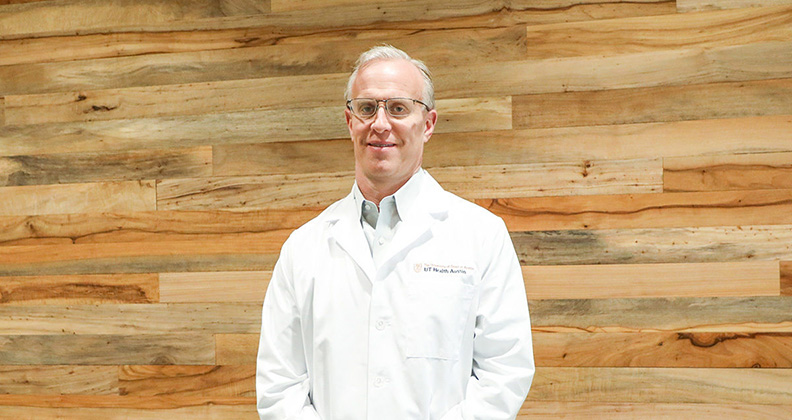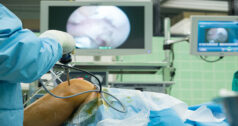
As was shown last week at AAOS, companies are taking strides to connect their devices with technologies that support improved patient outcomes. That connection can come in the form of M&A activity—which certainly applies to transactions announced over the month of March in joint replacement.
In other segments, companies acquired to bolster growth in specific segments, such as spine, sports medicine and wound care—the latter while getting a side of orthobiologic products in the deal. Let’s look at some of the M&A announcements that are hitting the news as we approach the end of 1Q19.
Joint Replacement M&A:
Smith & Nephew Acquiring Brainlab Joint Reconstruction Business
Together, these companies plan to accelerate R&D and product commercialization in digital surgery and augmented reality.
Brainlab provides pre-op planning, intra-op navigation and tools for post-op evaluation and information sharing that are used in >40,000 cases annually, in 500+ accounts worldwide. Smith & Nephew is gaining access to cloud computing, tracking, augmented reality, robotics, artificial intelligence, machine learning, image fusion and anatomic segmentation.
The companies will develop applications in joint replacement and sports medicine, potentially expanding to other specialties later.
The initial priority will be installation of Brainlab’s hip software onto NAVIO 7.0, the next version of SNN’s handheld robotic surgical system, and upgrading current users to the new platform, supporting total and uni knee and total hip procedures. NAVIO 7.0 will be commercially available in 2H19.
Smith & Nephew also gains Brainlab’s orthopedic salesforce, while Brainlab reaps the benefit of deploying its products to ambulatory surgical centers through the Smith & Nephew distribution network.
SNN will release a next-generation surgical robotics platform in 2020, which analysts note is based on Brainlab’s Cirq platform. The new offering would be faster and smaller than NAVIO, and future options could expand to incorporate augmented reality, standalone robotic arms and machine learning.
Corin Acquiring OMNI, Robot-assisted Total Knee Replacement System
OMNI is the manufacturer of the OMNIBotics® robot-assisted total knee replacement system. This acquisition gives Corin a greater foothold in the U.S., where robotics is growing rapidly.
OMNIBotics combines a robotic cutting guide with what is billed as “the world’s first robotic tool to measure ligament function.” Combined with the Optimized Positioning System for hips, OMNIBotics gives Corin flagship technologies across multiple segments as they strive to create a connected digital ecosystem throughout a patient’s episode of care.
Exactech Acquires XpandOrtho
XpandOrtho has developed a ligament balancing instrument for knee replacement. The technology will be used to enhance ExactechGPS® computer-assisted navigation and advance the Truliant® total knee.
One of the two co-founders of XpandOrtho developed e-Knee, the first “smart” knee prosthesis designed to collect detailed information on forces that occur when people walk, climb or sit down. In 2017, the company gained FDA 510(k) clearance in for the XO1 Knee Balancing System, intended as a tool for adjustment of soft tissue to reduce instability from flexion gap asymmetry. The intra-articular device uses sensors within the joint to guide ligament balance, and a pneumatic-based bellows system to wirelessly communicate with a display to provide the surgeon with gap balancing feedback throughout range of motion.
Spine M&A:
Brainlab Acquires Medineering
Medineering is a developer of application-specific robotic technologies; this move strengthens Brainlab’s capabilities in support of spinal surgery. For nearly three years, it has marketed the Medineering surgical arm under the brand name Cirq®. Cirq can be aligned in seven degrees of freedom for positioning flexibility; once locked into place, a surgeon can perform the procedure with both hands. Navigation integration works with established workflows, set-up and instrumentation. The combination of base arm and attachable “hand” modules makes Cirq scalable in the future.
The arm will join Brainlab’s open hardware architecture that allows device companies to design their own solutions and applications across numerous subspecialties. Unlike larger robotic systems priced at over $1 million, the lightweight lower-cost Medineering arm mounts to the siderails of the operating table, making the vendor-neutral platform accessible to many of Brainlab’s 4,000+ existing customers and expanding market reach into ambulatory surgery centers.
RTI Surgical Completes Acquisition of Paradigm Spine
RTI Surgical completed its previously-announced $300 million acquisition of Paradigm Spine, and is integrating the coflex® Interlaminar Stabilization® device into its own portfolio.
The minimally invasive coflex implant is FDA Premarket Approved to treat moderate to severe lumbar spinal stenosis alongside decompression. coflex has wide payor coverage in the U.S., and in 2016, ISASS issued recommendations and coverage criteria for decompression with interlaminar stabilization for select patients with lumbar spinal stenosis.
The move supports RTI’s growth acceleration strategy for spine, which includes investment in differentiated products while building scale. RTI’s spine portfolio includes metal and synthetic implants and instruments as well as biologics to treat degeneration, deformity and trauma.
Sports Medicine M&A:
Stryker Acquires OrthoSpace
Stryker bolstered its sportsmed segment in this all-cash transaction with a potential value of $220 million.
OrthoSpace developed InSpace, a biodegradable sub-acromial balloon spacer designed to treat massive irreparable rotator cuff tears. It is approved under the CE Mark and marketed in Europe and other countries in Latin America and Asia.
In the U.S., InSpace is under clinical study and not approved for use. A 184-patient randomized, single blinded control study is comparing InSpace to conventional/partial repair to treat full thickness massive rotator cuff tears. FDA approval could be secured within 2021.
Past investors in OrthoSpace include Johnson & Johnson, Smith & Nephew and HealthPoint Capital.
Orthobiologics (and Wound Care) M&A:
Smith & Nephew to Acquire Osiris
Smith & Nephew entered into an agreement to acquire Osiris Therapeutics for ~$660 million. The deal is expected to close in 2Q19.
While the transaction is primarily complementary to SNN’s wound management business, Osiris also brings BIO4® viable bone matrix, an alternative to autograft, and Cartiform® cryopreserved viable osteochondral allograft for articular cartilage repair. Cartiform is exclusively distributed by Arthrex and BIO4 by Stryker. Analysts report that the Arthrex agreement is not expected to change, with no comment on BIO4 reported.
This is SNN’s second purchase of 2019, following closure of the Ceterix acquisition in early 1Q19.
JAV
Julie A. Vetalice is ORTHOWORLD's Editorial Assistant. She has covered the orthopedic industry for over 20 years, having joined the company in 1999.




